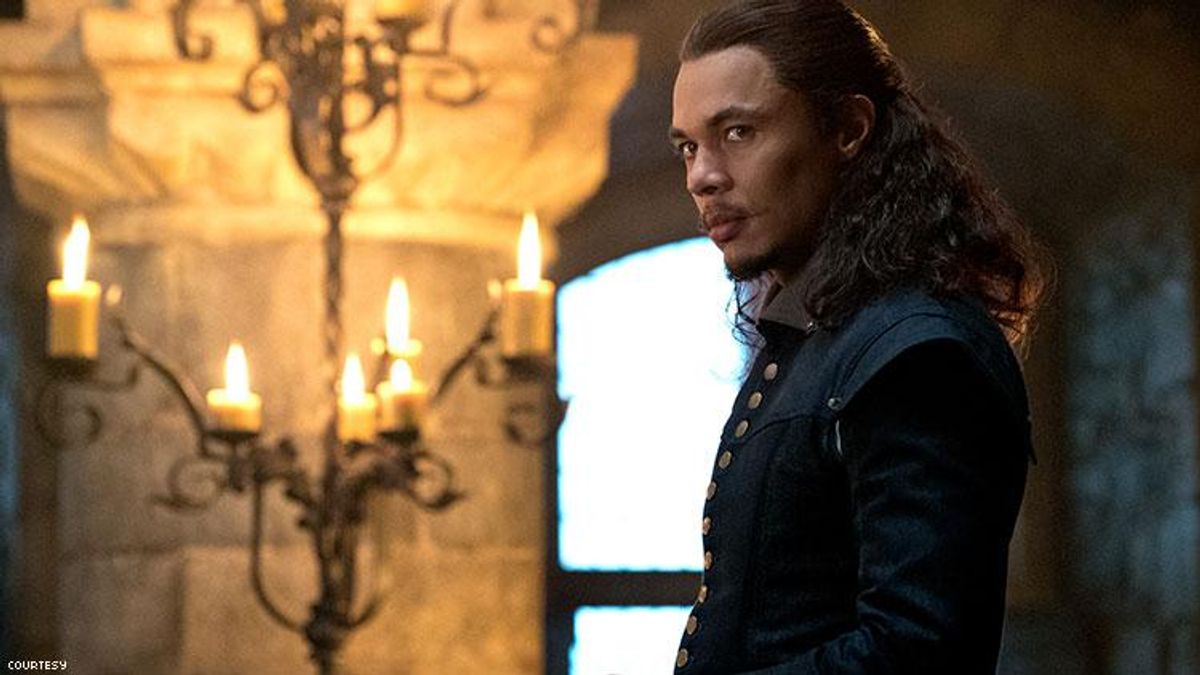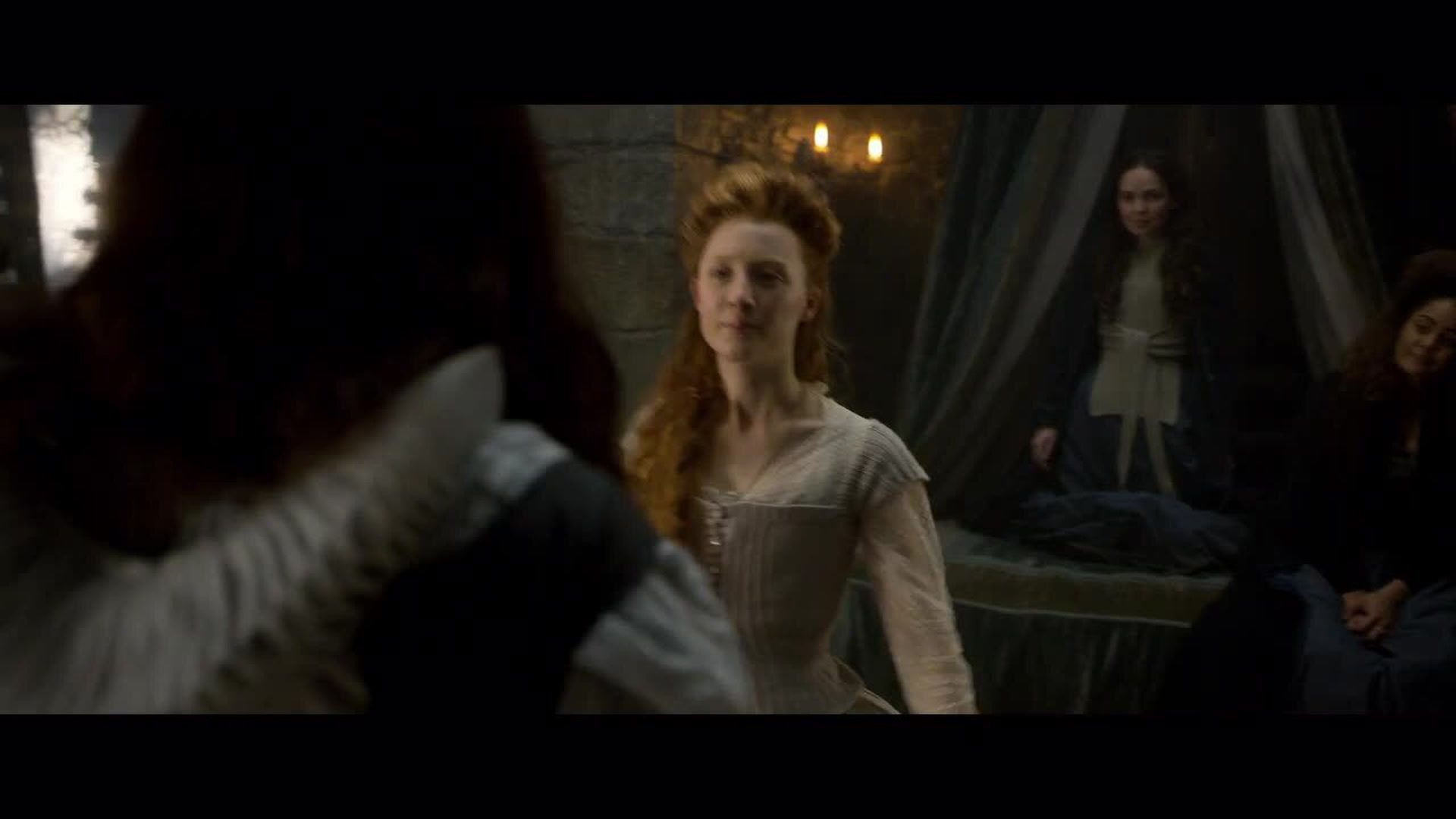A sweeping epic of a period piece complete with ladies in waiting, corsets, and courtly ritual, Mary Queen of Scots also draws a line from the 1500s through to today. At its core, the film from renowned theater director Josie Rourke about cousins Mary Stuart (Saoirse Ronan) and Elizabeth I (Margot Robbie), excoriates men who fear powerful women, a theme that resonates for modern audiences. But it also puts a uniquely prescient stamp on depictions of gender and sexual fluidity while showcasing an abiding friendship between a woman and a queer man --in this case, Mary and her private secretary Rizzio, played by Ray Donovan's Ismael Cruz Cordova.
An Italian singer and a violinist, Rizzio rose through Mary's court to become her trusted friend who shared private moments with her and her ladies in waiting. In one scene in the film, Rizzio, dancing for the women in Mary's private chambers, asks of the Scottish monarch, "Is it a sin that I feel more a sister to you than a brother?"
Sensing that he's crossed a line, Rizzio pulls away, but Mary replies, "Be whoever you wish with us."
It's one of several scenes in the film in which Mary and Rizzio's mutual love is on display, despite his later bedding her husband, the ineffectual Lord Darnley. But in a movie where toxic masculinity ultimately rules, it is the friendship between the queen and the queer man that's perverted by power-grubbing men.
"I grew up with all women. In a way, it's such a beautiful history of this man among all these women and that sensibility," Cordova tells The Advocate about how he understood his character. "I was the only boy in my household, I had a bunch of sisters, aunts, cousins."
Cordova, a Broadway actor who appeared on Sesame Street and had a recurring arc on The Good Wife, says he understands "that realm of the female energy and female power.
"[The] female figures I had in my life were by no means soft and weak," he says. "For me, [Rizzio] goes beyond the topic of sexual orientation. It also goes into the energy of this person. People have feminine and masculine energy and energy in between. That comfort he expressed, I understand it by virtue of upbringing."

Prior to landing the role, Cordova (who's stars opposite Gina Rodriguez in the highly anticipated Miss Bala) wasn't familiar with Rizzio's story. He subsequently took violin lessons and participated in Scottish court camp to help shape the role. He also visited Rizzio's grave. But Rizzio jumped off of the pages of House of Cards scribe Beau Willimon's script when Cordova first read it.
"Certain characters, as soon as you read them you feel like you understand them and you also feel like they understand you back," Cordova says of Rizzio, adding that he felt the same way about his Ray Donovan character, the boxer Hector.
"I felt very warm towards him. The relationship that [Rizzio and Mary] had and the way it's depicted in the script. The story is so beautiful and she's so gentle with him," Cordova adds.
"[Rizzio] is one of the people that kept all of her secrets, which is what ignites a lot of that jealousy," he says, referring to the cadre of Mary's not-so-trusted male advisers who conspire to undo her by accusing the very pregnant monarch of adultery with Rizzio and then disposing of him in a particularly savage manner.
Based on British historian John Guy's book Queen of Scots: The True Life of Mary Stuart, the movie seeks to reframe Mary as a lively, effectual leader despite prior depictions of her and the fact that she was imprisoned for 19 years under Elizabeth's rule before the English queen signed Mary's death warrant. Guy, who researched apocryphal letters and work -- some of which hadn't been read since the 19th century -- to arrive at his interpretation of the facts, also leaned into the sexual fluidity of the era in terms of Rizzio's and Darnley's sexual identities.
In the end, it's Darnley whom Mary's advisers manipulate into accusing Mary and Rizzio of an illicit affair. The accusation results in Rizzio's murder and Mary being pushed out of power while the men wait for her infant son to grow so that they can seat him at her throne.
While Rizzio's and Darnley's demises fall under the "bury your queers" trope in Hollywood storytelling that LGBTQ audiences have rightfully pushed back against, the facts of both men's violent deaths are generally not disputed in history. Mary Queen of Scots acknowledges their queerness and extrapolates out the patriarchy's fear of the other from then to now, highlighting the violence and discrimination LGBTQ people are still up against.
"It's just everywhere and you can see it -- the toxic masculinity, the way that men have to perform," Cordova says. "We're all inscribed against our will to perform in a certain way."
Cordova cites attacks on transgender people under the Trump administration, like the proposed military ban and the attempt to define trans people out of existence, as examples of toxic masculinity at work.
"There's an erasure. There's such a war on trans lives," he says. "There's an erasure of so many groups of the queer community."
Amid the discrimination though, Cordova, 31, is likewise inspired by the generation of LGBTQ people coming up behind him who are breaking down barriers.
"I am so incredibly inspired by all these young adults that are coming up -- 17, 18, 19 to their mid-20s that are doing beautiful work in exploring their sexual expression, gender expression, their queerness, the bounds of the gender norm."
Watch a clip of Rizzio and Mary below.





















































































